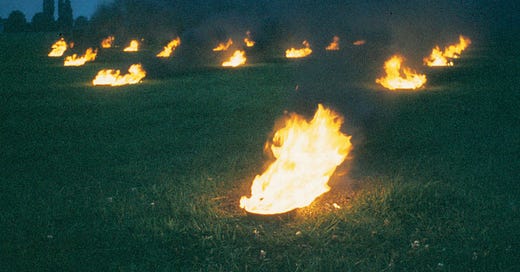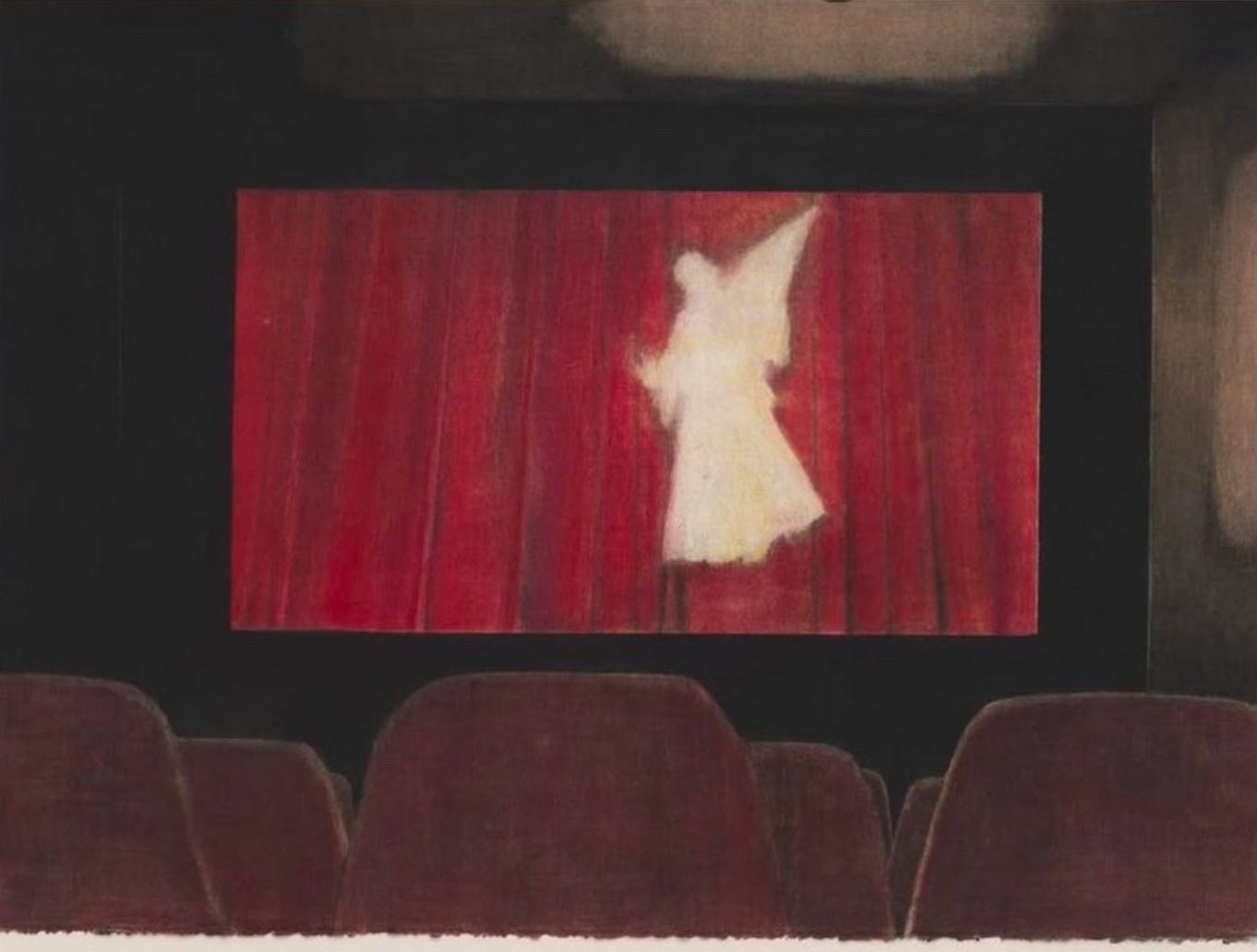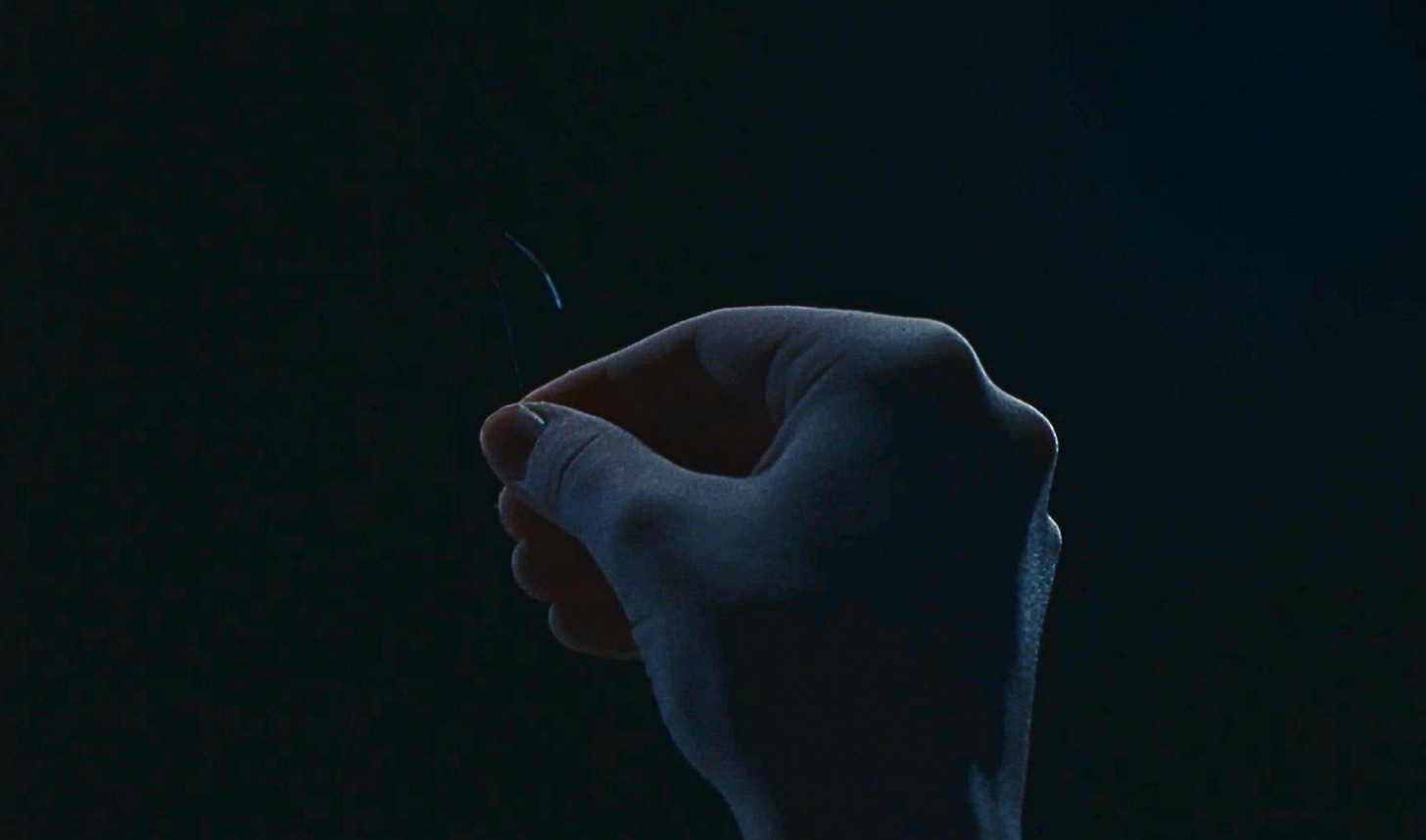There is the sense, above all, that the barmaid wants to go home. Her eyes are unfocused, but gleaming with reflected light. She knows something that the customer doesn’t. Yesterday, standing in front of the painting, I felt unable to move. I’ve seen the painting before but actually standing in front of it made me feel as though the top of my skull had been wrenched off my body and the low, warm light of the 19th century was pouring in. For the last year and a half everything I’ve written has tried to capture that space in the painting which exists between the barmaid and the patron. Two opposing magnets coming together, the ugly, crushing power of their magnetic forces remaining in stasis over that thin space above the bar. The vulnerable skin of her wrists faces out at the patron, acting at once as both a reminder that she is a young woman with arteries leading to her heart, and also as bollards to which she secures herself in the ocean of shifting faces. It’s defeatist, in a way: she puts her weight on her hands (ignores her pulsing feet? looks past the customer, thinks of home? what use are some broken in Docs when you’re almost a century and a half in the past, laced into small, impractical shoes for your small, impractical feet?) and knows that she will not get into bed for a long time. There is, sometimes, the sense when you read, that customer service, like scrolling on your phone or peeing, is the purview of another realm; an irrevocable fact of the living world existing beyond the page. How many writers who live on customer service ever get published? Who has the time? So many writers hemmed in by the very fact of writing from the belly of the beast. Their books have to wait until the work shirt has been set down.
In Toni Morrison’s books, working with food is an aspect of history which exists as a brutal and bleak necessity for survival. The mothers in Beloved and The Bluest Eye bring home leftovers from their work to feed their children. She understands that it is impossible (or at the very least, very, very hard) to excavate any romanticism when you’re working a job which you have been forced into by a facet of the imperial core which seeks to eradicate your entire existence. In this way, in how far I am removed from such an experience, I am moved to be grateful. I am young. When I worked two jobs over the summer it was for me alone. I was saving up for a move which I wanted to define the rest of my life. My body burned down to the wick, but it kept up. I wasn’t even paying rent. I know now that I never want to do it again if I can help it. These are all thoughts which come from such a lucky birth that I want to cut my head open in atonement. Even being able to enjoy steaming milk during the coffee rush is, too, a privilege beyond my wildest imagination. But even within Morrison’s work—these service jobs are not just jobs being just worked by women. They are a symbol. They are a sign. They speak for the world outside of themselves. This is what is so compelling about it—nothing is just one thing. Everything is because it isn’t something else.
On the far, other side of the spectrum, Stephanie Danler’s Sweetbitter, the kind of Iowa Writers Workshop piece which makes you want to murder Franzen, comes close to capturing the magic of being run off your feet during the dinner rush, but there is still this separation. Danler’s romanticism is the kind that can only come with hospitality jobs being such a distant memory that they become, once more, beautiful. And still, she grasps for the meat of the thing and just so happens to miss—the blending of days, the monotony made bardo, all swallowed in the tide of letting your boss fuck you in his office. But who wants to finish a shift at work and immediately pick up a book about getting back behind the bar?
In short: Peggy Phelan wrote that it is impossible to write about experiencing a piece of art without “invok[ing] the rules of the written document and thereby alter[ing] the event itself” and so the body cringes at trying to convey what it means to be so lucky to get to walk through an art gallery and be moved by a painting. By one of the most famous paintings in the world to boot! The heart flops down in its cage! Originality, the authentic, unmediated “real” a distant memory!!! And here I think of Ishiguro asking if it also feels this way for you. Take my hand. Do you see it, too?
Once more I feel aware of my body. I take the steps up from the train two at a time and wonder when I started rushing. If you missed one day, there was always the next, Gluck intones, forever, in the back of my head. The gallery at which I saw Manet’s barmaid is one where I felt, mildly, afraid of the attendants hovering in the doorway, who might come up to me—short hair damp from the rain, trying to look interested in the thin skein of blood adorning yet another painting of the crucifixion—and ask to see my ticket, again. I have been to Tate Modern about four times in the last three months—there, it is nothing unusual to see a 20 year old, alone, leaning in close to read the placards. In a building which once housed the architects of evil, it feels like another. But in this country, in this age, in these buildings, haven’t they all? Tate Modern being, of course, the symbol of the shining new Millenium! Did Blair, a man whose evil will be shamefully forgotten in the wake of bigger, louder evils, not walk the long, flat plane of the Turbine Hall? Did the Thames not offer up one thousand small pieces of the lives of a different, mouldering century from its currents and, at last, cede the space for the basement to be built? Did we not, in January 2000, still believe that the world only spins forward? But it’s just the muscles scraping against themselves. I have spent more time with other people in the last 12 months than I have in, perhaps, my entire life. Being alone, for the first time ever, feels strange.
But it’s almost spring. I’m on the tips of my toes reaching for it—at 18, sick with April, I wrote “I feel unkillable and the world is bright again. Every song I listen to is the best song I’ve ever heard. Every person I meet wants to kiss me and I want to kiss them back.” At 20, “I get sick when I don't write, but I become wired when I read, I become electric and the body calls out in the sound of overlapping plastic clicks that follow the operators’ hands across the switchboard.” And, at 19,
“Don’t you just feel like a livewire? I feel like a livewire. The trees are blossoming. The saturation dial at the back of my neck has been turned up half a notch. Every move burns me and every burn moves me. I have scars from the steam wand at work. There are bruises on my legs. I’m always so tired. I want a week off from everything. I want a week to just sit and think. I am booked up for the next two weeks. I want to be even busier. I want to stay in bed for days.”
O, what sacrosanct joy! What maniacal, lovesick feeling contained in the body on the verge of completing another lap around the sun! I read these screeds from the person I used to be, and try to remember how it feels. For the love of God, a Michelle Zauner from over a decade in the past shouts over the guitars of Summer Wounds, someone get the girl to shut up! But Spring is coming. I pull the strawberry from her mouth.
David Lynch believed in the strange, roving story of Blue Velvet, so you do, too. No sense of having to prove yourself. I watched Theda Hammel’s Stress Positions and that film’s ironic, harsh cynicism is hot enough to blister. Watching it, I ached for the kind of trust and belief which sustained directors like Lynch, the ones who love their characters and the story they are telling, instead of resenting them in every moment that the film they chose to make drags on. But that is not to say that I want everything to be sweet and earnest all the time! We live in the end of days! We need awful stories to purge the awful feelings inside of us! Saccharine positivity, decrying fatalism in all forms, pretending that we’ve seen the difference and it’s getting better all the time even now!!!! in these times!!!, will not save us! At the core: never allow one to negate the other. The binary will not save us but the murky ambiguity which lies in the space between might come close. What sustains Blue Velvet is that it is a story about awful things told earnestly—love anchors the film, is the engine on which it chugs along. Dorothy Vallens wants her son back in her arms. Sandy wants the robins back on the trees.
And so when the good guys march into the room at the end of the film and Jeffrey and Dorothy and all the citizens of Lumberton get to live happily ever after, it is with the knowledge that there is something for their joy to butt up against. That, for the fragility of their joy and the deep core of evil which it exists alongside, you, too, can survive. You rejoice for them and in turn you rejoice for yourself; Lynch as Maggie Smith’s realtor, walking you through a real shithole. So this is the core, then: there was no pretense with Lynch. He believed in the worlds he created. He believed in what happened to Dorothy, to Laura, the divers awful things that happen to women both within the home and without. His films are like plunging your face into a sink full of cold water, entering a world slightly to the left of ours, where the gauzy barrier between dreaming and waking is even thinner, even weaker. None of this is to say that we don't have earnest filmmakers anymore. But we won't have David Lynch again. Which is also not to say that his legacy is perfect. Polanski and his long, evil shadow draw close. But I am sad to have lost a guiding light. He shepherded two generations of filmmakers into the world, gave something to set themselves for or against. The dream is the telling of the dream, Susan Sontag once said, and Lynch always told them well.
WHAT I’VE BEEN READING: Woolf’s Mrs Dalloway (good, with caveats which have mostly to do with the sprawling shadow cast by the Empire, hovering at the corners of your vision), Cusk’s Outline (fine, mostly), Taylor’s Filthy Animals (made me wish I had bit the bullet and just reread The Late Americans instead), Nelson’s The Latest Winter (“you don’t refuse to breathe do you and breathe we do”).
WHAT I’VE BEEN LISTENING TO: Ode To Street Hassle by Spacemen 3 (a song which is not a cover but is still in its cogs and bolts more of a cover than a straight cover would have been, saying things over the same bassline with words which at first appear similar but become transmuted through the singer’s voice into an entirely new vocabulary; still, always, the ceaseless desire to place yourself within the history of a song), 360 by Aṣa (a reminder that all is not lost, that I’ll be waiting, I’ll be home, that for centuries the world has not been bigger than the song you are listening to and the world before your eyes and that it is still, even now, possible to leave the slipstream and rest on the vibrating body of a pulsing, plucked guitar).
It has been raining for days. My room remains the same size, but the walls do stretch and contract, occasionally. My fingers smell of nicotine and citrus. My life is full of so much beauty that it feels rude, even gluttonous. I am 20 and gorging myself on this abundance. We have been born at the end of time. That's easy to say but it's harder to live through it. Old wars rage on for the first time. I live in a country that is sustained by suffering elsewhere, and has been sustained like this for centuries. Something looms above all of us and will take us down with it when it goes. My hair is growing longer. Soon the light won’t get through to my scalp. Love from me and mine to you and yours.
xo








so very wonderful! moved me! <3
AAAAAAAAAAAAA always a delight and a privilege to read your work, it never fails to move me, adjusting the angle just slightly so everything becomes more clear